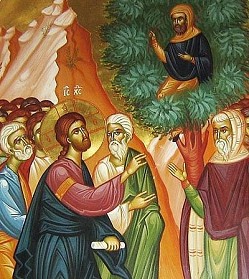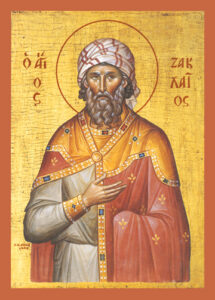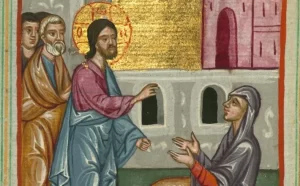- or Pre-Pre-Pre-Pre Pascha, if you wish
A Very Long Introduction
If you were going on a long auto journey to some lovely place, how would you approach it?
Here, I think, is what you would not do: You would not wait till the very last minute, then just jump in your car and drive off. These things require planning.
If you’re a sensible person, (as I’m sure you are) you’d approach it in three stages:

1 You would plan ahead – where you want to go, what you might want to see, articles you’ll carry along for the trip. You’d also prepare yourself for what you’ll have to leave behind for a while: your television, your bed * and your favorite easy chair. *
- “Gasp…”, said the 84-year-old blogger.
2 Then you would make the actual preparations. You’d get enough money for the trip. You’d check carefully online to see how to get there – the best route, avoiding road construction and so on. You’d get a guidebook. You’d make sure your car was tuned up, tire pressure checked, enough gas in the tank – – or if you’re ecologically responsible, you’d find out where the charging stations are located along the way. You’d pack your suitcases. You’d make sure you’ve got your credit cards – and your cellphone, so that every Friday you can keep up with your favorite Blog.
3 Only then would you get into your car and leave.
Do you suspect I’m leading up to something? You’re right!

That is what happens at this time of year in the Holy Orthodox Church. We are about to begin what Father Alexander Schmemann called our Journey to Pascha. *
- If you don’t have this book, please get it. You can find it at most book sources. If you own it, please read it. If you’ve read it before, read it again.
Why is this Lenten journey so important? Because it is not just about fasting and Church services. Far more, it is our annual symbol, our annual “living out” of our journey through life towards Christ, through the Lent of this world towards our own Resurrection in the heavenly Kingdom, through the darkness of this world’s late winter into the Light of the eternal Spring and Summer.
Of course, this is where my “going off on vacation” image falls apart. We don’t come back from Pascha – we move on in time, hopefully “further up and further in” each year towards the Kingdom of Heaven. If we are so blessed after the end of life as to attain that goal, we’ll never return from there.
Or if we do not attain the Kingdom of Heaven, we won’t return from that either – much as we might want to, much as we might want to retrace the steps of our life.
The day when we leave on our annual Lenten journey to Pascha goes by two names: the Sunday of the Last Judgment and Forgiveness Sunday, which this year falls on February 26. We’ll say more about that as that time draws near.
However, the Orthodox Church (being a sensible Church) provides us with four Pre-Lenten Sundays when we prepare for the journey. You’ll hear more about also that in due time. *
- Until very recent times, traditional Western Christians also had a Pre-Lenten season of preparation. They don’t anymore. A great loss, it seems to me.
In addition, the Orthodox Church (being an extraordinarily sensible Church) provides us with two Sundays before Pre-Lent (which I call Pre-Pre-Lent), when we, in effect, begin to plan for Great Lent.
At this time of year, in this Blog, I stick fairly closely to the liturgical calendar. I’ll try (probably unsuccessfuly) not to repeat too much from previous years.
The two Sundays of Pre-Pre-Lent are the Sunday of Zacchaeus (which is this Sunday January 21) and the Sunday of the Canaanite Woman. * Brothers and sisters, we’re now going to do some Bible study.
- Is the Russian/Slavic lectionary somewhat different here? No matter, I’ll stick to what I know.

First Sunday before Pre-Lent: The Sunday of Zacchaeus
Gospel: Luke 19:1-10
Why does Zacchaeus help us plan for a good Lent? a good journey? a good End? Because Zacchaeus was a seeker. He wasn’t satisfied where he was, with what he was. Zacchaeus was dreaming about somewhere better, becoming something better, even if he didn’t know quite where or what yet.
Jesus was famous by now. Crowds gathered wherever He was, and now He was coming to Jericho, down along the Jordan where lived Zacchaeus, a tax collector. Zacchaeus was a little man, not only physically but also morally and spiritually. Tax collectors were despicable men who worked for the Roman oppressors. In those days there was no tax on individuals, only a quota for each district, and a tax collector was allowed to bully and squeeze as much as he could get out of people, pay his quota to Rome and then keep the rest himself. Tax collectors were greedy, dishonest traitors. People hated them. Perhaps Zacchaeus hated himself.
Point 1: Face up to reality. All of us are like little Zacchaeus: spiritually small. We all have a long way to grow. So be dissatisified with yourself. “I’m ok, I am who I am, I am what I am” will get us nowhere. Seek to improve, become better.

Point 2: Go climb a tree. Go where you can see Jesus better. I like to imagine little Zacchaeus perched up in that sycamore tree. Now picture yourself up there. Lent is our annual time to do what we always should be doing: seek Jesus. We have a great advantage over Zacchaeus. We already know where Christ can easily be found. So now plan during Lent to climb up to where you can see Him better. That’s why (I hope) you climb out of bed and get to church every Sunday. During Lent worship more, pray more, read the Scriptures, study more, and above all do good to others, love more. .
As on any trip, during Lent we’ll have to leave some things behind. We give up some food, some entertainments, some distractions – not because they’re bad, but so nothing gets in the way of our journey, so we can concentrate on what is most important: coming closer to the Lord, becoming better people.
Point 3: Prepare to meet Jesus. Go looking for Him and you may
be surprised. You may find Him, or actually He will find you.
“Whoa!” said Zacchaeus – not exact quotes here – “Jesus is looking right at me!… And then the last thing I expected: He said to me: ‘Hurry, come down! I must stay at your house today'”.
Seek Christ and you may get more than just “religion”: If He has not done so already, He may come alive to you personally. You may hear Him speaking to you through the words of the Gospel. As You receive Holy Communion, He may come alive in you,.You may see Him looking at you in the faces of people around you: your family, your friends. And in the needy you’ll see Jesus Christ waiting to be loved and served. In all this, you also find Christ waiting to love and serve you.
Point 4: Then, like Zacchaeus, receive him gladly. People often see religion as a duty: Oh, I’ve got to go to church, I’ve got to pray again, I’ve got to forgive. It’s my obligation. What a pain in the neck that kind of religion is. That’s not true religion. No, receive Him gladly, and then be prepared again: “Lord”, said Zacchaeus, “Look: I give half my goods to the poor; and if I have taken anything by cheating I restore it four-fold.” Well, likely you won’t have to go that far. Remember, Zacchaeus was a major cheat; he had a lot to make up for. However, seek Christ and let Him into your “house”, and it will cost you, too: money certainly, but a lot more than money. Christ wanted Zacchaeus’ whole life. And Zacchaeus gave it to Him gladly, joyfully.
Early Church records say Zacchaeus gave up his revolting line of work and followed his Lord, became one of the Seventy Apostles, and then first Bishop of Caesarea over on the coast. Quite a change from being a greedy, cheating traitor!
Likewise Christ calls us to change our way of living, our way of thinking, our values – and, to repeat, it will also cost us some money. maybe a lot of money. “For where your treasure is there will your heart be also.” That’s from the Gospel on the Sunday before Lent.

Point 5: Prepare to be saved. Jesus said “Today salvation has come to this house.” The word salvation (σωτηρία, soteria) in New Testament Greek doesn’t mean just getting off the hook, so God won’t punish us. It means holiness, health, wholeness, becoming the person God created you to be. “Abundant life”, Jesus called it, coming fully alive.
So go seeking Him and… Well, each year on April 20 the Church commemorates Saint Zacchaeus, Holy Zacchaeus. That’s what Christ did for this nasty little tax collector. I feature Zacchaeus up in Heaven saying “How did this ever happen to me? how did I, a rotten sinner, turn into a saint?” That’s what He can do for us sinners, too, you and me.
Lent is coming. Consider now how to seek Jesus, and then prepare yourself for what may happen next.
Second Sunday before Pre-Lent: The Canaanite Woman
Gospel: Matthew 15:21-18.
This woman of Canaa was also seeking something: healing for her daughter. This is one of the most difficult stories in the New Testament. One of our New Testament professors in Methodist seminary was skeptical about much in the Gospels, but he was sure this was authentic, because who would ever make up a story like this about Jesus?
I really wish the Church Fathers had found a different Gospel for this Sunday, but they didn’t. So I’ll try my best to explain it.
The Moral of this story is “Never give up. Never give up. Never give up.” I’ve put the moral first, in order to try to make this difficult story less difficult as we go through it.
Jesus took the Apostles north into the land of Canaa, Gentile territory in what is now southern Lebanon. He needed to get away from the crowds that followed Him in Jewish territory, so He would have time alone to teach His disciples, because His time was running short.
 A woman from that region came to Him saying something quite amazing for someone who was not a Jew: “Lord, Son of David”, she cried out. There could be no misunderstanding what she meant. “Son of David” was a Messianic title: the Messiah was to arise out of the house of David. How did this pagan woman know this? “Lord, Son of David, have mercy on me”, she cried. “My daughter is severely possessed by a demon.”.
A woman from that region came to Him saying something quite amazing for someone who was not a Jew: “Lord, Son of David”, she cried out. There could be no misunderstanding what she meant. “Son of David” was a Messianic title: the Messiah was to arise out of the house of David. How did this pagan woman know this? “Lord, Son of David, have mercy on me”, she cried. “My daughter is severely possessed by a demon.”.
Now Jesus, who is good and loves mankind, didn’t even respond to her. He said nothing to her, nothing at all. The disciples were even less sympathetic: “Send her away, she keeps crying out after us.” Such a nuisance! Jesus seemed to agree: “I was sent only to lost sheep of house of Israel”. *
- Only the Jews believed in one God. Only Jews could see that if Jesus was God, He was The One and Only God.
But still…. All this poor woman wanted was one little miracle for her poor suffering daughter. How much effort would that have taken on His part. He had already healed pagan Gentiles: the Gadarene demoniac(s), the daughter of the centurion. This would be just one quick healing. So why didn’t He?

Some say He was trying to find out if she really believed He’s the Messiah, or whether she’s just putting it on, trying to “work Him”. But as John wrote, Jesus “could see into the hearts of men”. He already knew what was within her heart and mind – as He does with each of us. So that couldn’t have been the reason.
So this story remains a mystery. We have no explanation.
The woman fell down before Him: “Lord, help me.” It’s a pitiful scene. He gave her a dreadful answer: “It is not good, not right to take the children’s bread and throw it to the dogs” Actually it’s not quite as harsh as that; the word means “little dogs”, “puppies”. But it’s still harsh. He is still refusing to heal this poor woman’s daughter. She answered, “Yes, Lord, but even dogs, even puppies eat the crumbs which fall from their Master’s table.”
You can feel Him just melt. Whatever His reason for hesitating, He couldn’t resist this. “Woman”, He says, “great is your faith. Let it be as you wish.” With that He granted her what she had been seeking: her daughter was immediately healed.
Someone said that God always answers our prayers: either “Yes” or “No” or “Wait”. Sometimes we pray for truly good things, but the time isn’t right yet. Sometimes the time never comes till we go through the gate into the Kingdom of Heaven.
But why did the Fathers place this Gospel here just before

Pre-Lent? Hers’s all I can make of it: Our Journey towards Pascha takes a while. We will have many weeks of fasting and praying and seeking and waiting before we get to the Paschal Feast. Our Journey towards the good things which we seek in the Kingdom of Heaven will take a whole lot longer. Seek as hard as me may, pray as much as we may, God will give us the good things we seek in His time, not ours. We won’t understand His timi.
So keep seeking, keep asking, keep praying. Never give up. Pascha 2023 will come eventually. Our eternal Pascha will come eventually.
As we seek with Zacchaeus, as we wait with the Canaanite Woman, we have a promise to help us:
“Ask, and it will be given to you; seek, and you will find; knock, and it will be opened to you. For everyone who asks receives, and he who seeks finds, and to him who knocks it will be opened.” Matthew 7:7-11
Next Week: Saint Perpetua of Carthage – Was it wrong for her to be a martyr?
Week after next: Pre-Lent
Dearest Friend Fr Bill
You gave me the best piece of advice. “Wait. Wait on God’s leading “. The Woman from Canaa had to wait as well. Her prayer and request were answered and so was mine—just not how I (we?) expected. Your blog writing is a blessed and inspiring gift from God! The Kid
Thank you, Becky. (Dear readers: You can perceive that Becky is not only a reader but also a friend – from the little village in Ohio where we both grew up.)